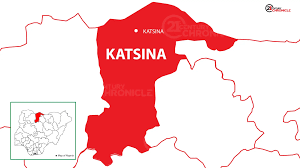By NPCU Press Published 1 year, 5 months ago

The Katsina State government has re-emphasized its commitment to the furtherance of girl-child education in the state, in regards to enrollment, retention, completion of secondary education as well as transition to higher levels of education.
This disclosure is in recognition of the huge impact of education on the socio-economic and cultural well-being of a society.
Katsina State Governor, Rt. Hon. Aminu Bello Masari, stated this recently at the Government House when a delegation from the National Project Coordinating Unit, (NPCU) of the Adolescent Girls Initiative for Learning and Empowerment, (AGILE) Project and the World Bank paid him a working visit.
The NPCU-World Bank team visited Katsina State as part of its biannual Implementation Support Mission (ISM), to ascertain the State’s level of project implementation, with the view of giving proper guidance and support.
Masari said that his Administration in an effort to improve the standard of secondary education in Katsina state, has put the necessary measures in place like the qualifying examination to ensure that graduates of secondary schools are well-learned and productive members of the society.
The Governor who pledged his support to the AGILE Project in the State said that the present focus of his Administration is to get Out-of-Schools children, especially girls and young married girls, re-enrolled in schools and financially empower them through skills acquisition.
In her remarks, the AGILE Project’s Task Team Leader (TTL), Aisha Garba, commended the State’s level of project implementation as she noted that there has lot of improvement since the Bank’s previous visit.
Despite the improvements, she made suggestions on areas that need more governmental efforts.
The Task Team Leader suggested that the process of qualifying examinations for secondary school students should be made all-inclusive and digitalized, taking cues from countries with similar peculiarities as Nigeria.
Garba noted that many students who fail the qualifying exams and those who cannot afford the fees drop out of school, thereby worsening the State’s Out- of -School children index.
The Task Team Leader also suggested that the State collaborates with the World Bank on the establishment of skills acquisition centres for secondary schools, and young married girls in the state.
The AGILE Project’s Deputy National Coordinator, Mrs. Ajanigo Abuka, who represented the National Project Coordinator, Mrs. Amina Buba Haruna, commended Katsina State on its impressive level of project implementation, and the judicious use of resources to achieve the Project’s objectives.
Part of the facilities inspected by the NPCU-World Bank team were the proposed sites for the construction of new schools, renovated school buildings and classrooms, hostels, Water, Sanitation, and Hygiene,(WASH) facilities, etc.
The team also scrutinized the School Based Management Committees' (SBMCs’) utilization of allocated resources, to ensure that they were in accordance with the stipulations of the Federal Ministry of Education and World Bank.
The AGILE Project is a World Bank-assisted project of the Federal Government aimed at improving secondary education opportunities for adolescent girls in the current implementing states of Borno, Ekiti, Kaduna, Kano, Katsina, Kebbi, and Plateau.
Copyrights © 2023 Adolescents Girls Initiative For Learning and Empowerment (AGILE). All Rights Reserved.